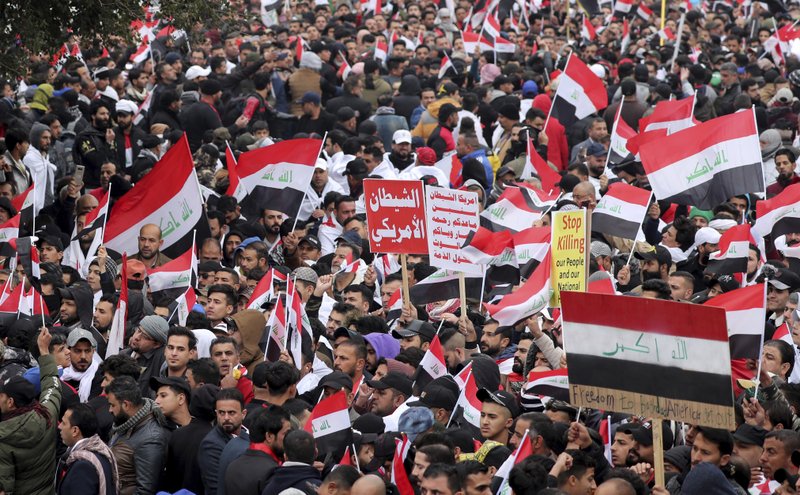Thousands rallied in Baghdad on Friday to demand that American troops leave the country, though their numbers fell short of the “million-man” march called for by an influential Shiite cleric. The rally came amid heightened anti-U.S. sentiment after a U.S. drone strike earlier this month killed a top Iranian general in the Iraqi capital.
Since mid-morning, large crowds gathered on the Muslim day of prayers as loudspeakers blasted “No, no America!” at a central square in Baghdad. A child held up a poster reading, “Death to America. Death to Israel.” But by the afternoon the rally had failed to reach the critical numbers called for by radical cleric Muqtada al-Sadr.
Apparently seeking to show control, al-Sadr’s supporters did not engage in altercations with security forces or target the separate, anti-government protests in neighboring Tahrir Square, a possibility feared by activists in the lead-up to Friday’s march. Officials and experts said the rally was the cleric’s attempt to capitalize on brewing anti-American feeling and show he had the upper-hand on the Iraqi street as negotiations among political elites over who should be the next prime minister stumble on.
In his weekly Friday sermon, Grand Ayatollah Ali al-Sistani, Iraq’s most revered Shiite cleric, called on political parties stop stalling and move the talks forward.
“The formation of the new government is constitutionally long overdue, it is necessary for the various parties concerned to cooperate,” al-Sistani said in a sermon delivered via a representative,“it is an important step toward resolving the current crisis.”
Roads and bridges leading to the heavily fortified Green Zone, the seat of Iraq’s government and home to several foreign embassies, including the U.S. Embassy, were blocked off by concrete barriers. Iraqi security forces stood guard, blocking access to the gates to the zone.
There was a heavy security presence as the protesters, mostly Shiites hailing from the capital but also Iraq’s southern provinces, walked on foot to an assembly point in Baghdad’s Jadriya neighborhood, waving Iraqi flags and wearing symbolic white shrouds.
Al-Sadr, whose party won the most seats in the May 2018 parliamentary elections, had called for a “million-man” demonstration to demand the withdrawal of American troops following the U.S. drone strike near Baghdad’s airport that killed top Iranian general Qassem Soleimani and senior Iraqi militia commander Abu Mahdi al-Muhandis. The killing sparked the ire of Iraqi officials from across the political spectrum.
According to U.S. military officials, rather than draw down, Americans have poured 20,000 additional troops in the Middle East to counter what Washington describes as an escalating threat from Iran. There are around 5,200 U.S. troops in Iraq, where they help train and assist Iraqi forces in the fight against the Islamic State group.
Iran has long sought the withdrawal of American forces from neighboring Iraq, but the U.S. strike that killed Soleimani in Baghdad has added new impetus to the effort.
In a statement Friday, al-Sadr — whose followers fought U.S. troops after the 2003 U.S.-led invasion to oust dictator Saddam Hussein — issued a list of conditions for American military presence in Iraq. The list includes cancelling existing security agreements, closing U.S. military bases, ending the work of American security companies and closing off access to Iraqi airspace.
If the conditions were met, the statement said, “the resistance will temporarily stop until the last soldier leaves Iraq,” al-Sadr said, referring to American troops.
Al-Sadr, once a huge thorn in the side of the American occupation after the 2003 invasion, derives political capital from his ability to call on supporters to clog streets and paralyze all movement in Baghdad.
Friday’s rally came at a critical time as rival political blocs are jockeying over the selection of a premier to replace outgoing Adel Abdul-Mahdi. It was supported by mainstream Shiite parties, including that of al-Sadr’s political rival Hadi al-Ameri, who heads the Fatah bloc in parliament, as well as the Popular Mobilization Units, an umbrella group comprised of an array of militias, including Iran-backed groups.
Al-Sadr “proved once again he can amass the crowds to take them to the street, cleverly prevented any targeting of protesters in Tahrir Square,” tweeted Farhad Alaadin, head of the Iraqi Advisory Council and a former presidential adviser.
In response to a public outcry over the U.S. airstrike that killed Soleimani and al-Muhandis, Iraq’s parliament passed a non-binding resolution this month, calling on the government to expel foreign troops from the country. Kurdish and most Sunni lawmakers boycotted the vote.
“The American forces should leave,” said an 18-year-old protester, Amer Saad. “I am ready to fight against the Americans if Muqtada al-Sadr asks us.”
Police and militiamen of the Popular Mobilization Units also closed off roads leading to the protest site, in both Karada and Jadriya neighborhoods of Baghdad. In Tahrir Square, anti-government protesters carefully eyed al-Sadr’s anti-U.S. rally but no confrontation took place. As the anti-U.S. demonstration dwindled away by the early afternoon, the anti-government protesters remained in their sit-in.
“I am not against the Sadrist movement’s demonstrations today, but if Muqtada asks for the exit of the Americans and non-intervention, he should raise the same slogan against Iranian interference, to be honest,” said one of the anti-government protesters, Yahya Mohammed.
In neighboring Iran, Ali Shamkhani, the secretary of Iran’s Supreme National Security Council, said the Baghdad march on Friday was a “countdown” to expelling U.S. forces. “It indicated that Iraqi people are the flagship on the path of expelling the U.S. from the region,” he said.
Cleric Mohammad Hassan Abutorabifard who led Friday prayers in the Iranian capital, Tehran, told worshipers that Iraqis at the rally “stood by Iranians” following Soleimani’s killing.
“The legitimacy of the West-appointed puppet rulers in the region has totally collapsed,” he said.








































admin in: How the Muslim Brotherhood betrayed Saudi Arabia?
Great article with insight ...
https://www.viagrapascherfr.com/achat-sildenafil-pfizer-tarif/ in: Cross-region cooperation between anti-terrorism agencies needed
Hello there, just became aware of your blog through Google, and found ...